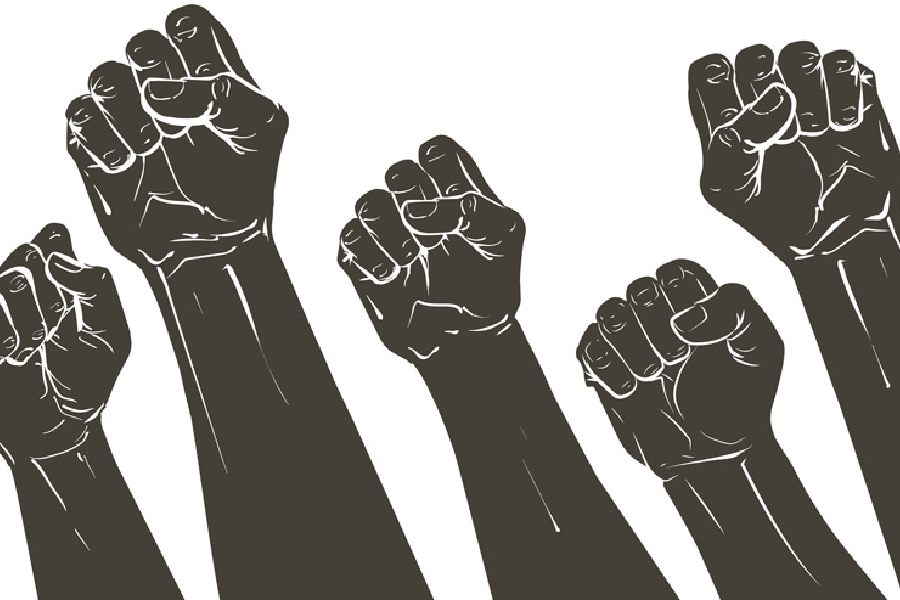If you alight at the railway stations or bus stands in or around Tankuppa in Gaya district of Bihar and say "Lal Salam" (Red salute), the chances are that the people there will either start giving you directions or may offer you a ride.
For Lal Salam is not just a greeting or slogan of the left-wing activists, but also a village, which stands as a testimony to decades of struggle against the feudal social order, Naxalism and violence.
Nestled among the hills, the village is located around 20km southeast from Gaya city, which serves as the headquarters of the district that was considered a "left-wing extremism" affected one by the central government till a couple of years ago.
“The village was previously called Rainpuri, but the Naxals erected a memorial of one of their commanders who fell here in 1984 and named the place Lal Salam. The name stuck and gained currency among the people. The long sway of Naxalism in these parts helped it,” Baijnath Bharti, an 82-year-old resident of nearby Nawan village, which along with Lal Salam is a part of Barsauna panchayat in the area, told The Telegraph.
And then Baijnath revealed softly in his quivering voice that he is a Communist Party of India (CPI) Gaya district committee member and a friend of Ramashankar Lal, after whom Lal Salam was named.
Ramashankar’s younger brother had borrowed some sugar from a landlord in the area for daughter’s marriage in early 1980s. Its cost was around ₹25 at that time, but when he tried to repay it, the landlord sought an amount of ₹2200, including interest, and threatened to take his farm land if he did not pay it.
They resisted the unreasonable demand and were also not financially well-off to meet it. Following which, the landlord’s henchmen tied Ramashankar’s younger brother to the gate of a railway crossing in the area and flogged him to set an example and strike fear among the common people.
“Ramashankar was also a member of CPI. But after the incident, he came to me frustrated and shared that he was going to join the Naxals as he had lost faith in the system. Within a few months his name spread everywhere as a staunch supporter of people’s cause. He kept helping the weak and the police kept searching for him,” Baijnath said.
Years passed and Ramashankar acquired the image of Robinhood among the people of the area.
“He (Ramashankar) and his men would come running if they got any information about any wrong done to the poor people. The samanti (feudal) people would flee away on his arrival. He was a messiah for us,” said Dharmendra Kumar, a farmer of Tankuppa.
However, the Naxal commander was surrounded by the police while visiting a house in Rainpuri on March 20, 1984. He shot and killed himself to escape capture.
Ramashankar’s elder son Uday Kumar Sinha, who works as a tourist guide at Bodh Gaya, was around 10-year-old when he lost his father.
“A large platoon of Naxals came one evening a few weeks after my father chose martyrdom. They erected a memorial of him, fired gunshots, distributed laddoos and declared the name of the place Lal Salam,” Sinha told The Telegraph.
The village now has nice roads, people maintain basic hygiene, several shops have come up and a Punjab National Bank customer point is also providing service there.
“We were from the upper castes, but my father lived and died for the poor and the downtrodden. He was against feudalism and did his bit to change it. The government could not ignore the place even after he was no more and the village has developed,” Sinha said.
“The people of the area respect us due to his work. My mother was elected as a panchayat samiti member in 2001. She lived at the village till her death in 2018. I am planning to contest in the Zila Parishad elections and will try to work for people just like my father,” Sinha added.
However, the police still remain a bit wary about Lal Salam, and they have their own reasons for it.
“The place has changed much over the years, but is still a bit sensitive because of its history as a dreaded area. The Naxal influence has subsided, but some of them still remain and our operations against them keep going on,” Gaya additional superintendent of police (ASP) Anwar Javed told The Telegraph.










